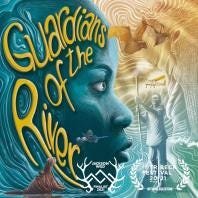How to Guard a River and Other Lessons in Producing an Award-Winning Podcast
Everything always takes more time than you think.
Cat Jaffee is a podcast producer and founder of the podcasting company House of Pod. She is the producer on Guardians of The River, a podcast series about the people who look after the Okavango water system.
The pod is available in English and currently being translated into Portuguese and Tswana.
The pod features Portuguese, Tswana, English, Luchaze, Lechue, Afrikaans, and SeYei. That's seven languages. "So, even in the original, English-facing episodes, we worked with a number of voice actors to help translate some of the portions of the show where speakers are communicating in their original languages," says Cat.
Tip 1# - Everything always takes more time than you think
"This work took a great deal more time, effort, money, and research than I ever could have imagined on the outset," says Cat. "To make each episode, we wrote anywhere between 10 and 20 episode drafts, often shifting the entire shape or direction of the story between iterations."
Each episode is like a documentary in its own right, with complicated characters, philosophical questions and sound-rich settings. "To create each of these things took a great deal of care, hours and hours of tape, along with individuals fact-checking, sound designing, scoring, translating, re-recording and hustling to get it all right."
Cat says that if she did this work again she would know where to better focus the team's time and energy.
"I believe the podcast presents a number of important perspectives that leave a lot of room for the audience to interpret for themselves," she says. These questions include: what is the best way to protect a place? What does power mean for each of us? "The strength of the show is that it offers an honest platform for people with many different backgrounds and viewpoints to share their own ideas," she says.
What's interesting about the show is that it has a number of target audiences, from the locals in the Okavango Delta to international communities around the globe.
"Because of the remoteness of the destinations the podcast describes we spent a great deal of time developing and recreating these places in audio for people's ears, near and far," says Cat. "The environment and the places themselves are almost like characters in the story, so even for people familiar with the locations we still found it critical to give them as much detail as we could."
LISTEN NOW: Guardians of The River. This is the story of the guardians of the Okavango water system. The podcast won the Best Narrative Nonfiction Podcast Award at the Tribeca Film Festival 2021.
Listen on Apple Podcasts and Spotify.
Tip 2# - Keep everything real and honest
"While we sculpted scripts and storylines, everything that is included is based on real in-person interviews I conducted with each of the show's characters, either while spending four months travelling with them in and out of the field, or later on in remote conversations," says Cat.
"It was never my decision nor directive to tell people what to say, only to represent their ideas as accurately as I could," she says.
There are challenges, when creating a podcast that deals with conservation, in getting it to people that don't seek that type of content out.
"I think there are a number of challenges in distributing a podcast about conservation to people who are not usually interested in the topic," says Cat. "But something that did help in our case, is that Guardians of the River is not overtly a story about conservation. There's adventure, expeditions, personal journeys, discoveries, interesting animals, and in depth detailing of history going back 500 years in the Okavango Delta Region."
"A number of folks have told me that the podcast didn't go in the direction they thought it would, and I think that's one of the best pieces of feedback I could hear."
All the best,
Paul
LISTEN NOW: Guardians of The River. This is the story of the guardians of the Okavango water system. The podcast won the Best Narrative Nonfiction Podcast Award at the Tribeca Film Festival 2021.
Listen on Apple Podcasts and Spotify.


